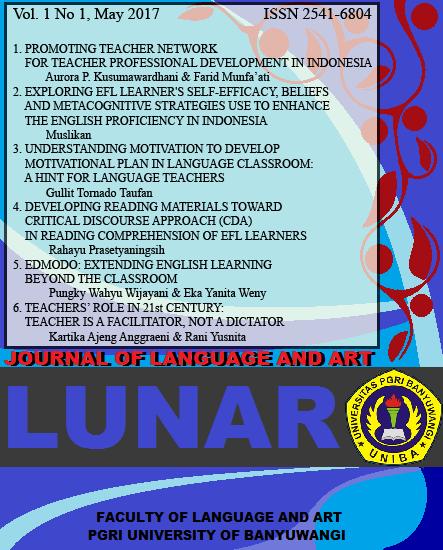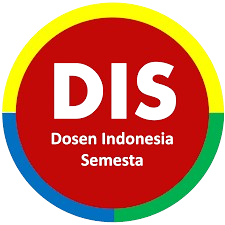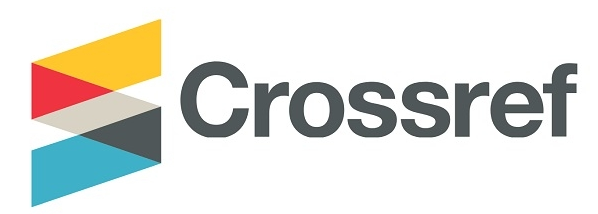PROMOTING TEACHER NETWORK FOR TEACHER PROFESSIONAL DEVELOPMENT IN INDONESIA
Abstract
Teacher Professional Development (TPD) is very important for teachers in Indonesia for maintaining their quality of profession. Also, by conducting TPD, the teachers could improve their competences and skills for the enhancement of their teaching practice which brings the increase of students’ achievement and the quality of national education later. Various activities can be conducted by the teachers for their TPD; nevertheless, many Indonesian teachers are unwilling to do TPD effectively. In this paper, we propose teacher network to be used by Indonesian teachers. The compatible and cost-effective nature of teacher network would be advantageous for the teachers. This paper provides three ways to do of teacher learning networks along with their advantages which can be considered to assist Indonesian teachers to have an effective TPD.
References
Amin, M. 2012. Professional Development of EFL Teachers. In Cahyono, B. Y. and Indah, R. N. (Ed.). Second Language Research and Pedagogy towards the Development of English Language Teaching in Indonesia. Malang: State University of Malang.
Amin, M. 2013. What Makes Teachers of EFL Professional or Unprofessional. Unpublished Dissertation. Malang: Graduate Program in English Language Education, State University of Malang.
Anugerahwati, M. 2009. Professional Competence for Teachers of English in Indonesia: A Profile of An Exemplary Teacher. Unpublished Dissertation. Malang: Graduate Program in English Language Education, State University of Malang.
Boling, C. J., and Martin, H. M. 2005. Supporting Teacher Change through Online Professional Development. The Journal of Educators Online, Vol. 2, No. 1, January 2005: 1-15. (Online) (http://www.edu/ncate/fdoe/…/Boling_Vita.doc) accessed on March 25th, 2014 09:09 AM.
Cahyono, B.Y. 2008. Peningkatan Kompetensi Guru Bahasa Inggris melalui Program-Program Continuous Development. A speech delivered in the inauguration of professorship. Malang: State University of Malang. (Online) (http://www.geocities.ws/eltindonesia/cahyono/pidato.htm), accessed on February 25, 2013 4.29 p.m.
Departemen Pendidikan Nasional. 2008. Peraturan Pemerintah No. 74 tahun 2008 tentang Guru. Jakarta: Departemen Pendidikan Nasional.
Gabriel, E. R. 2010. The Case for Differentiated Professional Support: toward a Phase Theory of Teacher Development. Journal of Curriculum and Instruction, Vol. 4, No. 1, May 2010: 86-95. (Online) (http://www.joci.ecu.edu/index.php/JoCI/.../82) accessed on Februari 17th, 2014 11:33 PM.
Hartatik, S. F. 2011. Improving Teachers Professionalism: Toward Better English Language Teaching in Indonesia. In Cahyani, H. and Cahyono, B. Y. (Ed.). Best Practices in the Teaching of English. Malang: State University of Malang.
Jong, O. D. 2012. Empowering Teachers for Innovations: The Case of Online Teacher Learning Communities. Creative Education December 2012, Vol. 3 Supplement, 125-129. (Online) (http://www.scirp.org/journal/PaperDownload.aspx?DOI=10.4236/ce.2013.44A003), accessed on February 17th, 2014 at 11:16 PM.
Kang, H.S., Cha J., and Ha B.W. 2013. What Should We Consider in Teachers’ Professional Development Impact Studies? Based on the Conceptual Framework of Desimone. Creative Education April 2013, Vol. 4 No. 4A: 11-18. (Online) (http://www.scirp.org/journal/PaperDownload.aspx?DOI=10.4236/ce.2013.44A003), accessed on February 17th, 2014 at 11:16 PM.
Mizell. H. 2010. Why Professional Development Matters. Oxford: Learning Forward. (Online) (http://learningforward.org/docs/pdf/why_pd_matters_web.pdf?sfvrsn=0) accessed on March 30th, 2014 10:37 PM.
Mustofa, M. 2011. Professional Development of EFL Teachers at Vocational Schools. Unpublished Dissertation. Malang: Graduate Program of English Language Education, State University of Malang.
Pedoman Pengelolaan Pengembangan Keprofesian Berkelanjutan (PKB), Buku 1. 2011. Jakarta: Direktorat Pembinaan Pendidik dan Tenaga Kependidikan, Kementrian Pendidikan Nasional.
Trust.T. 2012. Professional Learning Networks Designed for Teacher Learning. (Online) (http//www.edweek.org/ew/articles/network), accessed on March 28, 2014.
Tuhutseya, S. (2008, June 9). Mampukah Pemberdayaan MGMP Menjadi “Therapi Kejut” bagi Guru. (Online) (http://sawali.info/2008/06/09/mampukah-pemberdayaan-mgmp-menjadi/), accessed on May 28, 2013.
Vuorikari.R., Garoia.V., Punie.y., Cachia. R., Redecker.C., Cao. R., Cao. Y., Klamma. R., Pham.,M.C., Rajagopal.K., Fetter.S, Sloep. P. 2012. Teacher Networks Today’s and Tomorrow’s Challenges and Opportunities For The Teaching Profession. European Schoolnet (EUN Partnership AISBL). (Online) (http://service.eun.org/teachers-newsletter/TellNet_Teacher_Networks_web.pdf.) accessed on March 28, 2014.
Wahyuningsih, S. N. 2014. Redefining Success: Pursuing Professional Development through Reflective Teaching. A Paper Presented in the 6th NELTAL.
Downloads
Published
How to Cite
Issue
Section
License
This work is licensed under a Creative Commons Attribution-ShareAlike 4.0 International License.



















